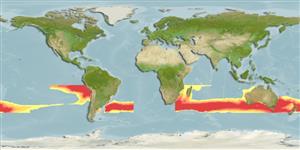Teleostei (teleosts) >
Aulopiformes (Grinners) >
Notosudidae (Waryfishes)
Etymology: Scopelosaurus: Greek, skopelos = a lantern fish + Greek, sauros = lizard (Ref. 45335).
Eponymy: Dr Elbert Halvor Ahlstrom (1910–1979) was an ichthyologist and biologist who spent more than four decades working for the National Fisheries Service. [...] (Ref. 128868), visit book page.
Environment: milieu / climate zone / depth range / distribution range
Ecology
Marine; pelagic-oceanic; depth range 0 - 700 m (Ref. 58018). Subtropical; 12°S - 45°S
Atlantic, Indian and Pacific.
Size / Weight / Age
Maturity: Lm ? range ? - ? cm
Max length : 20.0 cm TL male/unsexed; (Ref. 6602)
Epipelagic to mesopelagic species (Ref. 6602). Feeding adults are found on the continental slope in 400-500 m (Ref. 6602).
Life cycle and mating behavior
Maturity | Reproduction | Spawning | Eggs | Fecundity | Larvae
Paxton, J.R., D.F. Hoese, G.R. Allen and J.E. Hanley, 1989. Pisces. Petromyzontidae to Carangidae. Zoological Catalogue of Australia, Vol. 7. Australian Government Publishing Service, Canberra, 665 p. (Ref. 7300)
IUCN Red List Status (Ref. 130435: Version 2024-1)
Threat to humans
Harmless
Human uses
Fisheries: of no interest
Tools
Special reports
Download XML
Internet sources
Estimates based on models
Preferred temperature (Ref.
123201): 11.4 - 20.1, mean 14.9 °C (based on 121 cells).
Phylogenetic diversity index (Ref.
82804): PD
50 = 0.5001 [Uniqueness, from 0.5 = low to 2.0 = high].
Bayesian length-weight: a=0.01000 (0.00244 - 0.04107), b=3.04 (2.81 - 3.27), in cm total length, based on all LWR estimates for this body shape (Ref.
93245).
Trophic level (Ref.
69278): 3.3 ±0.4 se; based on size and trophs of closest relatives
Fishing Vulnerability (Ref.
59153): Low vulnerability (10 of 100).
